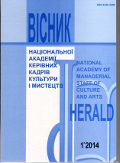THE WAYS OF THE DEVELOPMENT OF THE ARTISTIC AND AESTHETIC GUIDELINES IN THE UKRAINIAN THEATER
DOI:
https://doi.org/10.32461/2226-3209.1.2014.137915Keywords:
Theater, theater manager, theater activities, creativity, artistic-aesthetic levelAbstract
Speaking about the ways of the development of the artistic and aesthetic guidelines in the Ukrainian theater means to speak about the role of the administrative building in its development.
The theater managers should not only identify, but also form such ways, as satisfaction of aesthetic need of thecreative group, on the one hand, and on the other, provide the need for theater and art performances of the audience, so the average citizen of Ukraine. One can find the resultant in this situation only less than one condition: if the theatrical market in Ukraine is colourful and rich in a variety of artistic and aesthetic concepts and experiments, only it is in this sense, the role and the importance of theater management will be crucial. And not only that managers should ensure the financial health of the troupe, but the manager of the theater has to determine the creative direction of art search of the theater staff, to provide staff, its own niche in the theatrical process of Ukraine. And so the question of repertoire policy is to form the creative, artistic and aesthetic principles of the creative group. It should be the focus of management theatrical business.
The theatrical activity is diverse, rich and very responsible. The modern theatrical process and trends are conclusive. Therefore, the question of the theatre and expert aspect of the problem can not be excluded. The manager of the theatre and theatrical practice are a part of a unified phenomenon that can be defined as a modern Ukrainian theater process and they complement each other.
The Modern Theatre of Ukraine – multi-vector and in the fullness of repertoire, and in the principles of artistic transformation of life. So such approach in the Ukrainian theatre provokes the search and the emergence of new principles of theatrical activities, the new management theater tasks. It gives its universality and independence from certain aesthetic principles of the particular theater.
In spite of the multi-vector of the modern Ukrainian theatre, some managers of the modern theater remain captive to the old ideas in the modern theatre process.
The main task of any manager is to build a new theatre, to show the new artistic ways, to give a new breath to that has already happened and what is known.
Every of creative personalities according to his strength and capabilities should create a national art space.
Such activity is particularly useful to people now, in the time of national revival.
The experimental years were not marked with festive splendor; they were concentrated on hard work, intensification of cultural and artistic life in terms of democracy, transparency and moral insight.
However, if the theatre is ready today to fulfill its mission responsible? The theatre figures think, argue and they are seriously concerned and worried:
• It is clear that the further development of theatrical culture will be determined by social impulses, the activity of social forces;
• It is clear that we need fresh, not played repertory and artistic ideas for a modern audience, who compares the content of the work in the perception of real life and the relevance of the day;
• There is no doubt that the stage speech of the last years became boring, but we don’t have new; so we need transition to a new aesthetic quality;
• We agreed that the theater criticism needs to learn performing deeply, consistently, balanced;
• We need to improve the methods of theatre management.
The management of the theatrical production has its own specific features. However, we can not ignore the irrefutable fact that there are certain laws which determine the features of the sociocultural dimensions of modern theatrical process. But the main factor of successful theatrical activity is the necessity of consideration of the latest features of the modern theatre with its purposefulness and innovations. The neglect of such features threatens the transformation of theatrical process in the ordinary theater production. Then the creative artistic principles retreat for the tenth plan, which inevitably leads to the degradation of the group and slides to the ordinary of working abroad, and loss of audience. The theater manager must act as an art analytics. So the main subject is not to find money, but the analysis of the circumstances such as social, political, economic and art. The organizational outlook can save the theater (if it is correct), but it can disadvantage (if it is incorrect). That’s why every theater manager should be a creative person who has not only to know and admit certain artistic theories and positions, but also be able to direct the theatrical group to the advanced principles that will determine the fate of the theater arts in the future.
Downloads
Published
Issue
Section
License
Authors who publish with this journal agree to the following terms:
1. Authors retain copyright and grant the journal right of first publication with the work simultaneously licensed under a Creative Commons Attribution License International CC-BY that allows others to share the work with an acknowledgement of the work's authorship and initial publication in this journal.
2. Authors are able to enter into separate, additional contractual arrangements for the non-exclusive distribution of the journal's published version of the work (e.g., post it to an institutional repository or publish it in a book), with an acknowledgement of its initial publication in this journal.
3. Authors are permitted and encouraged to post their work online (e.g., in institutional repositories or on their website) prior to and during the submission process, as it can lead to productive exchanges, as well as earlier and greater citation of published work (See The Effect of Open Access).


